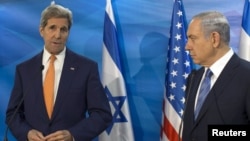A new poll of American public opinion released by the University of Maryland last week indicates that a plurality of surveyed Americans believes that the absence of serious peace diplomacy is most responsible for the current escalation of violence among the Israelis and Palestinians.
In an address to the Center for Middle East Politics at the Brookings Institution, U.S. Secretary of State John Kerry agreed with that notion and said the status quo is simply not sustainable, and that the level of distrust between the two sides has never been more profound.
"Israelis believe the Palestinians will never accept Israel's right to live in peace as a Jewish state, and they are teaching hate and glorifying terrorists, and that a peace agreement would just turn the West Bank into another Gaza," Kerry said. "The Palestinians believe this Israeli government will never give them a state and that their land is being systematically taken away and the daily indignations of occupation will never end, and that there is impunity for attacks against Palestinians."
Kerry said current trends including violence, settlement activity and demolitions are threatening the viability of a two-state solution, and that the trend has to be reversed in order to prevent this untenable one-state reality from taking hold.
International role
Experts have different views on what should be done to revive the troubled peace process. Some, like Khalil Jahshan, executive director of the Arab Center in Washington, argue that the U.S. should allow the United Nations Security Council to issue a resolution defining the terms of reference and a timetable to reach an agreement.
"The U.N., if allowed to perform its duties, could be the appropriate mechanism,” Jahshan said, “and could be an alternative peace broker with an increased role for the Europeans to try to strengthen the mediation process."
He noted that another option could be an international peace conference like the Madrid conference of 1991, with clear objectives such as ending the Israeli occupation and reviving the terms of reference based on exchanging land for peace.
But David Pollock, a fellow at the Washington Institute for Near East Policy, argued that convening an international conference could complicate the already troubled peace talks by involving more participants. Pollock prefers quiet diplomacy by all interested parties, including the U.S.
"Israel and the Palestinians need quiet encouragement from the U.S, Europe and the Arab countries that are now very interested in putting this conflict behind in order to focus on worse conflicts in Syria, Yemen or Libya, or between Arab countries and Iran," Pollock said.
Reviving the Arab Peace Initiative
Robert Wexler, president of the Center for Middle East Peace in Washington, said the Arab Peace Initiative could serve as an attractive alternative to bilateral negotiations between Israel and the Palestinians.
"For the U.S. to redo what it has done in the past and has failed doesn't make any sense. A simple new set of bilateral negotiations would lead to the same results," Wexler said. "Bring the Egyptians, the Saudis and the Gulf States so the Arab countries can create incentives for both sides and the Arab Peace Initiative could be developed into more details."
Wexler also recommended adjusting the language to remove suspicions; instead of insisting on getting a Palestinian recognition of Israel as a Jewish State, the language can be modified to the recognition of Israel as the homeland of the Jewish people that respects the legal rights of the 20 percent of Israeli Arabs.
Secretary of State Kerry hinted that expanding the U.S.-sponsored peace talks could be a better approach.
"We're ready to bring Jordan, Egypt, the rest of the Gulf States and others to the table for a regional security arrangement that includes Israel that will make the entire region safer," he said.
"And I know that many in the region are absolutely committed to recognizing Israel in the way that Israel wants to be recognized and to move forward to send embassies to open relations. And they are waiting to help realize the Arab Peace Initiative's vision of a true peace between Israel and the Arab world and greater security for all."
Kerry said it's achievable, but it demands that we never lose hope and we all draw strength from those who have sacrificed so much for peace.






